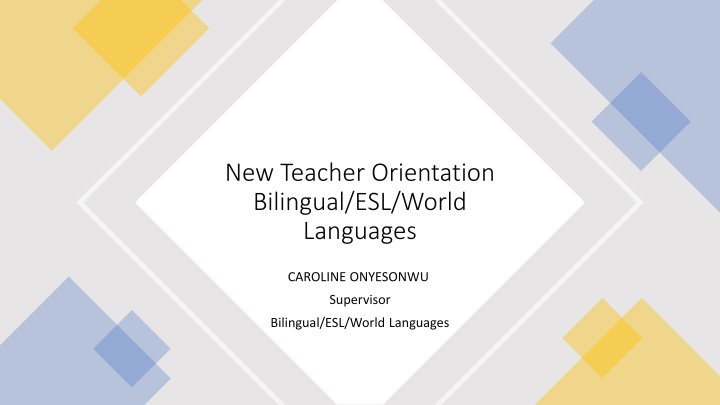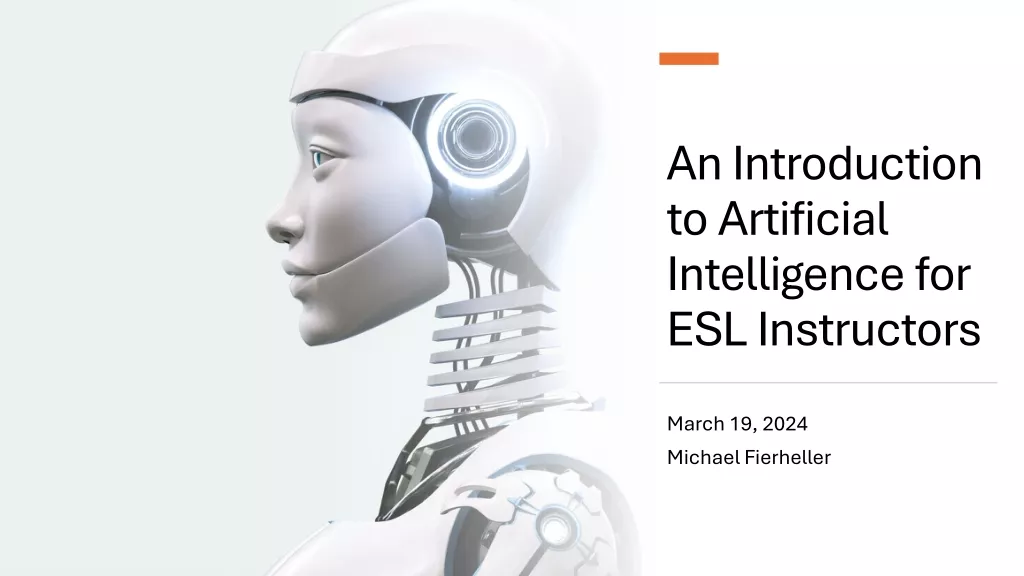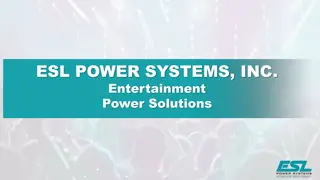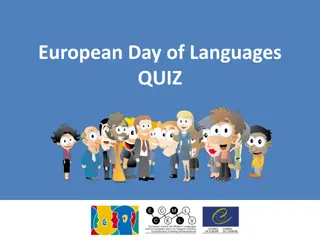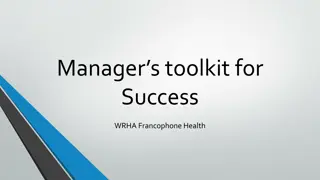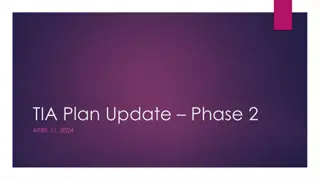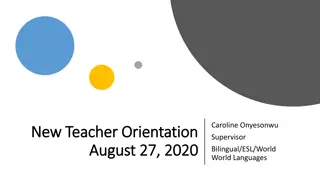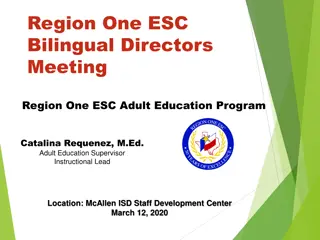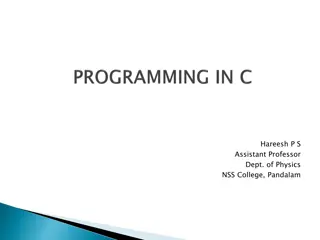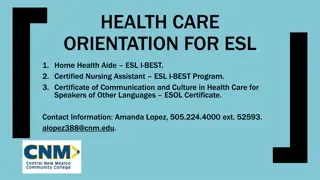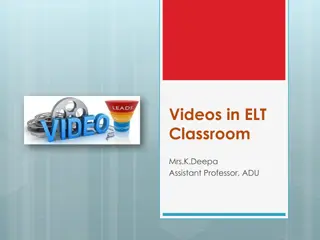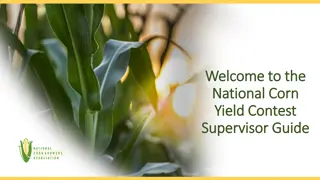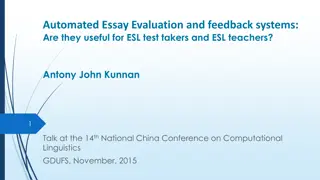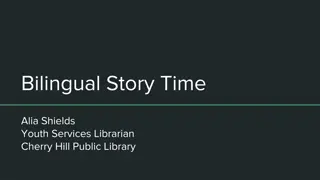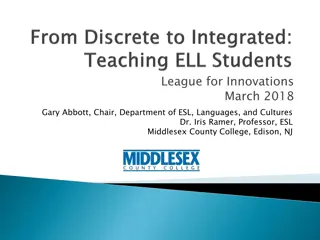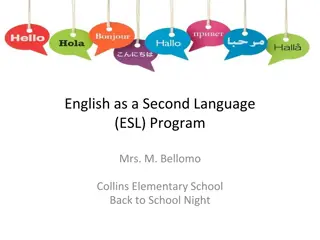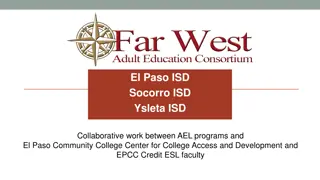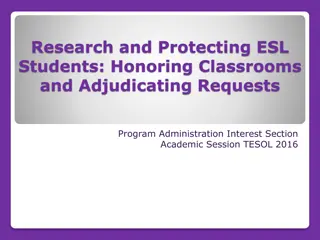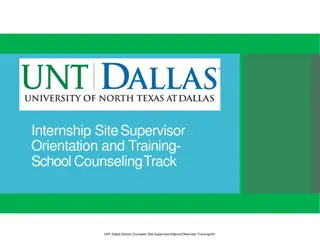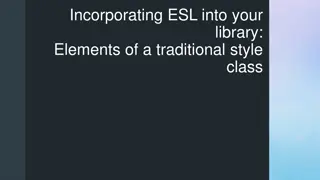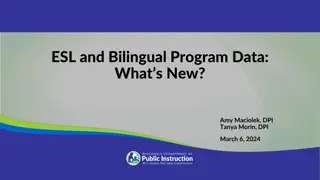New Teacher Orientation - Bilingual/ESL/World Languages with Supervisor Caroline Onyesonwu
Join the New Teacher Orientation focusing on Bilingual/ESL/World Languages, led by Supervisor Caroline Onyesonwu. The agenda includes valuable sessions on standards-based classroom curriculum, lesson planning for language learners, instructional strategies, and introductions to key educators in the field. Explore online programs, curriculum overviews, and resources to enhance teaching in diverse classrooms.
Download Presentation

Please find below an Image/Link to download the presentation.
The content on the website is provided AS IS for your information and personal use only. It may not be sold, licensed, or shared on other websites without obtaining consent from the author.If you encounter any issues during the download, it is possible that the publisher has removed the file from their server.
You are allowed to download the files provided on this website for personal or commercial use, subject to the condition that they are used lawfully. All files are the property of their respective owners.
The content on the website is provided AS IS for your information and personal use only. It may not be sold, licensed, or shared on other websites without obtaining consent from the author.
E N D
Presentation Transcript
New Teacher Orientation Bilingual/ESL/World Languages CAROLINE ONYESONWU Supervisor Bilingual/ESL/World Languages
AGENDA 10:00 A.M 10:00 A.M - - 11:00 A.M 11:00 A.M 11:00 A.M 11:00 A.M - - 12:00 NOON 12:00 NOON Profile of a Standards-Based Classroom Curriculum Overview vELA vMath vScience vSocial Studies vOnline Programs: WL/ESL/District vBenchmark & State Assessments: ACCESS/STAMP vFirst 20 Days of School 1. 2. Lesson Plan protocol Adaptations for ELLS within the lesson plan Language objectives Essential questions that relate to world situations Activities Direct Instruction in Small Groups Instructional Round Discussion/Questioning Techniques 3.
Caroline A. Onyesonwu, Supervisor Serrano Margaret, BIL Teacher, Lincoln Avenue School Amber Ingram, ESL Teacher, Cleveland Street School Denise Costello, ESL Teacher, Park Avenue School Introductions Introductions Yahaira Castro-Aguirre, BIL Teacher, Central Elem School David Bartlett, ESL Teacher, Orange High School .., ESL Teacher, Rosa Parks Community School ., Spanish Teacher, STEM Academy
https://drive.google.com/file/d/1v1LhsLmgefC OxeYweD-G2Ckij8Cn5yqG/view?usp=sharing Profile of a Profile of a Standards Standards Based Based Classroom Classroom vLearners: vTeachers vattitudes vClassroom Environment
Curriculum Overview District: https://www.orange.k12.nj.us/site/Default.aspx?PageType=1&SiteID=1&Cha nnelID=11&DirectoryType=6 vELA - https://www.orange.k12.nj.us/Domain/1297 vMath - https://www.orange.k12.nj.us/Domain/26 vScience - https://www.orange.k12.nj.us/Domain/28 vSocial Studies Grades K 4: https://www.orange.k12.nj.us/Domain/1925 Grades 5 12: https://www.orange.k12.nj.us/Page/16257
Online Programs: WL/ESL/District Rosetta Stone: en-US Learning A Z: https://accounts.learninga- z.com/accountsweb/account/home.do?submit=Log+In. Username: roweaudr; password: Orangeesl DreamBox Math Learning: http://www.dreambox.com/ https://orangetownship.rosettastoneclassroom.com/
Online Programs/Software: WL/ESL/District Cont. Discovery Education: https://app.discoveryeducation.com/learn/signin NEWSELA: https://newsela.com/articles/#/rule/latest Learning Ally: https://learningally.org/ Readorium (science) EDpuzzle DBQ (social studies) Edublogs Spelling city Starfall NWEA Reading Plus Brainpop Edulastic Education.com MobyMax Iread k-2
Benchmark & State Assessments: ACCESS/STAMP ESL/BILINGUAL WORLD LANGUAGES Benchmarks Flip grid WIDA Model ACCESS Benchmarks 1. ELA 2. Math 3. Science 4. Social Studies
The First Days of School Schedules and Student list (LEP Report) Make classroom welcoming Teach rules and consequences Lesson plan Bulletin boards Name tags School walk recognize areas of the school; draw a map Teachers and pictures posted Where do I line up for dismissal? Introduce classroom centers and activities
Lesson Plan protocol Expectations for ESL Expectations for ESL Teachers Teachers 1. Collaborate with co-teacher Lesson Components Adapted Lesson Components Adapted Essential Questions Interdisciplinary Connections Tech Integration Equip Needed Objectives Activities Differentiation Resources Assessments Homework Assignments Standards 2. Due by Thursday/Friday 3. Specific & intentional
Lesson Components Lesson Components Essential Questions (real world connections handout) Interdisciplinary Connections(ELA, Math,Science, etc) handout)
Essential Questions Points POINTS TOWARD IMPOR TANT, TRANSFERABLE IDEAS WITHIN (AND SOMETIMES ACROSS) DISCIPLINES. IS OPEN-ENDED; THAT IS, IT TYPICALLY WILL NOT HAVE A SINGLE, FINAL, AND CORRECT ANSWER. IS THOUGHT- PROVOKING AND INTELL ECTUALLY ENGAGING, OFTEN SPARKING DISCUSSION AND DEBATE. CALLS FOR HIGHER- ORDER THINKING, SUCH AS ANALYSIS, INFERENCE, E RAISES ADDITIONAL QUESTIONS AND SPARKS FURTHER INQUIRY. REQUIRES SUPPORT AND JUSTIFICATION, NOT JUST AN ANSWER. evaluation evaluation VALUATION, PREDICTION. IT CANNOT BE EFFECTIVELY ANSWERED BY RECALL ALONE. RECURS OVER TIME; THAT IS, THE QUESTION CAN AND SHOULD BE REVISITED AGAIN AND AGAIN.
Lesson Components Lesson Components Cont. Tech Integration (handout) (handout) Equipment Equipment Needed by subject or content area or content area by subject
Lesson Components Adapted Lesson Components Adapted Objectives 1. Language Objectives: Promote student academic language growth. Include the use of either receptive (listening and reading) and/or productive language skills (speaking and writing) Connect clearly with the lesson topic or lesson activities http://www.janaechevarria.com/?p=834 Handouts
Lesson Components Adapted Lesson Components Adapted Activities Differentiation State the domain of focus for each group if possible/necessary: reading, writing, speaking, listening Clearly delineate the proceedure (step 1, step 2, step 3) Add number of minutes each part will take if possible Content what you teach and expect students to learn Process How you teach (explicit instruction, modeling, multi-media, etc) Product (how you expect students to demonstrate learning DOL) Student groups use initials
Differentiating instruction means creating multiple pathways so that students (with different ability levels/learning styles/interests) can ALL be successful in learning and in demonstrating what they have learned. This Photo by Unknown author is licensed under CC BY-SA-NC. What is differentiated Instruction?
Instruction is differentiated depending on a student's: Learning style Interests Readiness Why Differentiate Instruction? By varying the Content Process Product
ORANGE CURRICULUM/NJSLS BASED/WIDA STANDARDS ESSENTIAL FACTS AND SKILLS (TFP - TRUTHS/FACTS/PRINCIPLES) GEARED TO STUDENT'S ELD LEVEL Content: what I plan to teach; what students need to learn CULTURAL CONNECTIONS PRIOR KNOWLEDGE
Process: how students access the information/learning styles Song or poem manipulatives Centers/stations Graphic organizers Show a video Internet based stories
Product how students show what they have learned/how I will assess QUIZ/TEST PRESENTATION PODCAST OR A BLOG SONG OR A POEM LISTEN AND RETELL * DEPENDING ON STUDENT ELD LEVEL
Basic Steps for Differentiation 1. Know the ELD level of your ELLs and other important background factors (language background, L1 literacy, prior schooling, special ed considerations) 2. Know your curriculum/content standards 3. Design outcomes by applying relevant assignment/assessment strategies to student ELP level while addressing same content standards (see Can- Do-Descriptors) 4. Support student success with instruction differentiated according to students' ELD levels (share ELD levels with all teachers) 5. Collect performance-based evidence to demonstrate student learning (growth and achievement) (authentic assessment portfolio)
Lesson Components Adapted Lesson Components Adapted Resources: Rosetta Stone Dreambox Learning a-z Video links
Lesson Components Adapted Lesson Components Adapted Formative/Summative/Authentic ASSESSMENTS HOMEWORK TIMELINE GUIDE TIMELINE GUIDE ASSIGNMENTS
Assessments cont. Analyzing student work: Analyzing student work: https://drive.google.com/file/d/1NQrD4dPIJb0Xesi-bsLUtiL3uce2SUd3/view?usp=sharing Diagnostic Formative (informal) Summative Authentic (performance- based) Pre & Post Self-assessments Entry/Exit tickets Observations Polling Student observations Homework Socratic discussions Student/teacher conferences Peer reviews Think-pair-share Entry/Exit tickets High stakes tests Multiple choice Checklist Portfolio culmination Performances Tests unit Teacher-created Essays Discussion board responses Interviews Reflection journals Sketchbooks Informal presentations Portfolios ongoing Project phases (over time) Critiques Essays over time
#1 - Social and Instructional Language (SIL) ELLs communicate for social and instructional purposes within the school setting. #2 The Language of Language Arts (LOLA) ELLs communicate information, ideas, and concepts necessary for academic success in the content area of Language Lesson Lesson Components Components Adapted Adapted Standards: WIDA #3 The Language of Mathematics (LOMA) ELLs communicate information, ideas, and concepts necessary for academic success in the content area of Mathematics #4 The Language of Science (LOSc) ELLs communicate information, ideas, and concepts necessary for academic success in the content area of Science #5 The Language of Social Studies (LOSS) ELLs communicate information, ideas, and concepts necessary for academic success in the content area of Social Studies
Lesson Components Adapted Lesson Components Adapted State Standards State Standards 21ST CENTURY ENGLISH LANGUAGE ARTS MATHEMATICS SCIENCE SOCIAL STUDIES
Direct Instruction in Small Groups Instructional Rounds v 45 minutes Small Groups (20 minutes each group) v90 minutes Participate in whole group in a co-teaching model (15 20 minutes) Small Groups (20 minutes each group) Handout https://drive.google.com/file/d/1AfCkn4M0D8pShjJTm_k0dncfJmy5DEWc/view?usp=shari ng
Discussion/Questioning Techniques https://www.youtube.com/watch?v=BGBLMdXnTmo Blooms' Taxonomy Webb's Depth of Knowledge How does this look in an ESL Classroom? Think of students' language proficiencies The Importance of High Quality Discussion https://www.teachingchannel.org/video/importance-high-quality- discussions
Discussion/Questioning Techniques Cont. https://drive.google.com/file/d/1Wo37D3TUBr5_yh-QDJCoc05EFR-U_tZX/view?usp=sharing Bloom's Taxonomy Webb's Depth of Knowledge
Reading Strategies 1. 2. 3. 4. 5. 6. 7. 8. 9. https://drive.google.com/file/d/1nWeM32RXf59Xz_36tKnoPyzteXjWzjZ9/view?usp =sharing Look look at the pictures for clues Mouth get your mouth ready to say the first sound Tap tap the sounds Reread go back and read it again Chunk look for chunks or parts you know Skip skip the word, read the sentence, then hop back and try again Flip flip the vowel. Try a short vowel, then try the long vowel Try try a word that makes sense Ask ask myself: Does it look Right?Does it Sound Right? Does it Make Sense?
What ws the story about? De qu se trataba el cuento? When did the story happen? Cu ndo ocurri el cuento? Reading Questions PREGUNTAS PREGUNTAS DE LECTURA DE LECTURA Who was in the story? Qui n estaba en el cuento? Where did the story happen? Donde ocurri el cuento? What was the problem in the story? Cu l fue el problema en el cuento? https://drive.google.com/file/d/1bSmUdgEv4bAv4S6ED1YVKvtgGMPy4VPC/view?usp=sharing https://drive.google.com/file/d/1bSmUdgEv4bAv4S6ED1YVKvtgGM Py4VPC/view?usp=sharing https://drive.google.com/file/d/1bSmUdgEv4bAv4S6ED1YVKvtgGMPy4VPC/view?usp=sharing
Resources & Readings Implementing English Language Learner Program Services in NJ Monthly Recurring ESL Tasks A Framework for Raising Expectations & Instructional Rigor for ELLs More than Words: Developing Core Speaking & Listening Skills Evaluation Instrument
Resources for the teacher First 20 Days of School Rosetta Stone Resources: https://support.rosettastone.com/en/k-12/Foundations-for-K-12-TOTALe-PRO/Implementation- Guide/Teacher-Resources#bottomOfPage Teaching Channel: https://www.teachingchannel.org/ Department of Education: https://www.nj.gov/education/ Bilingual/ESL Department: https://www.state.nj.us/education/bilingual/ WIDA: https://wida.wisc.edu/ WIDA AMS: https://www.drcedirect.com/all/eca-portal-ui/welcome/WIDA https://www.spellingcity.com/printables.html
